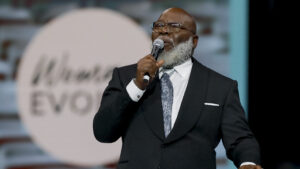
JACKSON, Miss. (BP)–I recently spent a rapturous afternoon at the movies watching (participating in?) Peter Jackson’s thunderous climax to the film trilogy of “The Lord of the Rings.”
Unless you’ve been raising chinchillas on Venus, you can’t have escaped the phenomenon of the three-movie cycle that began with “The Fellowship of the Ring” in 2001, “The Two Towers” in 2002 and now “Return of the King” in 2003.
Reviews have been almost universally positive, and even hard-boiled critics from Time, Newsweek and The New York Times seem to have run out of adjectives. Now, I am not the one to give an objective review in this case; I first read J.R.R. Tolkien’s half-million word opus when I was 13 and have read it every summer since. So my investment in the story is significant and not in the least rational. I went to the first installment with some reserve: Could this Jackson guy pull it off and remain faithful to the books I loved? It was a treat, then, when I was able to announce with trembling pleasure that, yeah, he sure did.
Much has been written about Tolkien’s strong Christian faith (and I heartily recommend the book “Finding God in the Lord of the Rings” by Kurt Bruner and Jim Ware for a fuller discussion of how Tolkein’s beliefs impacted his work). While Tolkein had a cordial distaste for allegory — and the book and movies never mention religion, Christ or even God — a reader or viewer is treated to unabashed representations of a very elemental good and evil and introduced to characters who display such virtues as courage, bravery, integrity, fidelity and an overall sweet wholesomeness. Conversely, the villains are of the darkest and most pervasive evil.
The Return of the King has broken all box office records for a Wednesday opening, taking in $34.1 million in one day. How does one interpret that? Try this one on, Hollywood: People will go to great lengths to see a rip-roaring good tale, expertly told, that is full of virtue and light.
I contend that even in our postmodern culture, people are attracted to a story that offers an unabashed vision of good and evil. In the wasteland that is modern Hollywood, here is a ray of light.
Upon reflection, I couldn’t help but compare this movie to other recent critically-acclaimed films such as “The Cider House Rules” (a pro-abortion screed if there ever was one) and “American Beauty” (in which the main character was a pedophile). Critically acclaimed, yes, but certainly not the box office bonanzas The Lord of the Rings trilogy has become. Like moths to a flame, people are gravitating to a movie series that has some moral vision as opposed to movies that are soulless, twisted and depraved.
Hollywood, get a clue. You are custodians of a medium that has the power to entertain, enlighten, amuse, frighten, thrill and move an audience to tears. As with many great forces of our time, cinema has the power to both uplift and degrade. My appeal to logic would be this: I know you West Coast folks are profit-driven. Why not use the considerable tools at your disposal to make movies that inspire? Tell us a story with excellence. Let the good guys be good guys and the bad guys be bad. If you need to show us evil in its proper context, that’s fine. Just give us something to hope for in the end.
People will come.
–30–
Tony Martin is associate editor of The Baptist Record, newsjournal of the Mississippi Baptist Convention.












